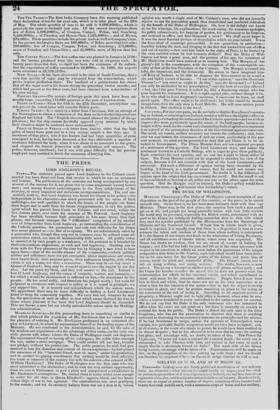THE DUKE OF WELLINGTON.
MORNING CHRONICLE—The Duke of Wellington cannot complain of any disposition on the part of the people of this country, or the press, to be unjust towards him. So far from it, he has been more leniently dealt with than any Minister. There was, in the first place, the surprise how such a man could get on at all; and people not being generally aware with how little wisdom the world may be governed, especially the British world, entertained with re- gard to his Grace an indulgent feeling, somewhat akin to that with which they read the epistles published by the Missionaries from the Sovereigns of Otalieite and the Sandwich Islands. If from him to whom much is given, much is required, it is equally true that there is a disposition in men to over- estimate the talent and wisdom of those from whom nothing is anticipated. It is this feature of our nature that leads to the admiration of Young Rosciuses, and all exhibitions even of slender talent, where none was expected. His Grace has shown no wisdom, that we are aware of, except in holding his tongue; and if he had not held the pen, and left us in the same ignorance with respect to his intentions in which we were before the appearance of his unique composition (the letter to Dr. Curtis), each individual would have been draw- ing on his own fancy for the future policy of his Grace, and given him, of course, credit for great and wonderful ability. His Grace's course was to rub on doing nothing, and saying 'nothing. The riddle, however, is now solved. The giving a triumph to neither party will please neither party ; and his Grace has besides revealed the secret that he does not possess even the determination for which he has received credit, and which contributed to atone with many for his notorious deficiencies. People have it now from him in black and white, that lie dares not act on his own conviction as to what is best for the interests of the nation—that in fact his object is merely to remain in place, and that he prefers remaining in place to the acting on his conviction at the risk of losing it. According to all received notions of propriety, a Minister ought not to hold office a moment, when what he con- siders a course beneficial to every individual in the nation cannot be carried. We do not say that the Duke is the only statesman who has remained in office when his views are not acted on ; but there is generally an anxiety to conceal this from the public. The Duke is almost the only man in the three kingdoms, who has not the penetration to discover that there is anything awkward in disclosing the inconsistency between his principles and his actions. If he had threatened to resign, unless the measure of Emancipation were carried, it is probable that his resignation would not have been accepted ; and, at all events, in the event of a return to power, he would have been enabled to be almost despotic ; but he has allowed it to be seen that he cares for nothing but place, and advantage will, no doubt, be taken of this. The Prince De Li the says, "I never yet knew a coward die a natural death ; for every one is encouraged to take liberties with him, and matters at last come to such a height that he is absolutely forced to fight." The weak side of his Grace being known, advantage will be taken of it. Encroachments will be made on him, on the presumption of his also putting up with them ; and we should not therefore be surprised if he e ore forced to resign whether he will or not.


















 Previous page
Previous page